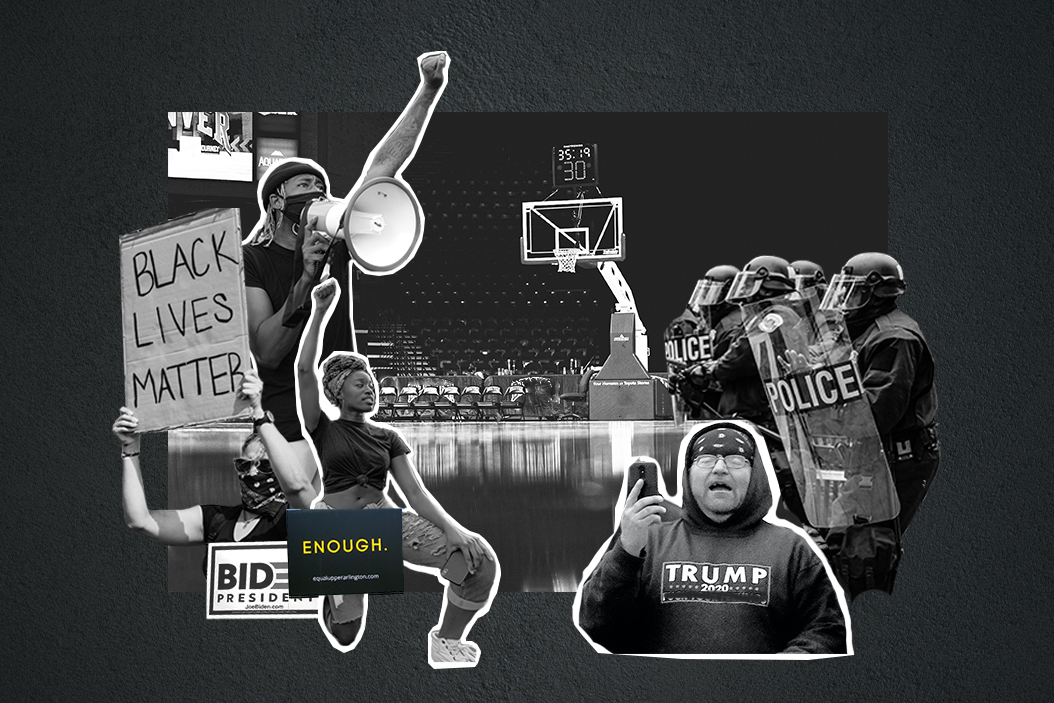Just twelve weeks after the killing of George Floyd by Minneapolis police galvanized a racial justice movement across the US — and the globe — the city of Kenosha in the US state of Wisconsin is aflame after protesters took to the streets to demand justice for Jacob Blake, a Black man shot in the back this week by a white police officer.
How are current protests playing out — and how has public and political sentiment shifted since demonstrations against police brutality erupted across the nation in late May?
Vigilante violence. While bouts of violence characterized some riots earlier this summer, this week's clashes in Wisconsin swiftly became more sinister in nature when a 17-year old white male — a former member of a youth police cadet program with an intense affinity for guns — opened fire at protesters, killing two people and seriously injuring a third.
He was arrested a day later by local police, but one influential right-wing media superstar's characterization of the shooter as a dutiful citizen who had no choice but to take the law into his own hands is a dangerous justification for... murder.
Professional athletes go deeper. After the Floyd killing, many prominent sportsmen and women spoke out against systemic racism, but this week many athletes with massive followings and multi-million dollar sponsorship deals went further in showing solidarity with the movement for racial justice.
In an unprecedented step, teams from the National Basketball Association refused to take the court in playoff games scheduled for Wednesday night in protest, as did the Women's National Basketball Association. Several Major League Baseball teams quickly followed suit, joining strikes in support of the Black Lives Matter movement. Protests of this kind in American baseball — still a largely white-dominated sport with a largely conservative culture — are something new.
Meanwhile, the US Tennis Association — which governs a notably white sport itself — suspended all games Thursday after Naomi Osaka, the world's highest-paid female athlete and a Black woman, said she was pulling out of a tournament in New York (she opted back in the following day).
Whether these gestures can move the needle on awareness or exacerbate polarization is unclear. But the refusal of athletes to play the game — and the potential personal and professional hit they could take as a result — marks a new phase of engagement by some of the country's most influential public figures.
The looming election. One key difference between now and the aftermath of the Floyd killing is the proximity of the US election, which is set to take place on November 3.
With Kenosha as a backdrop, Joe Biden and the Democrats are emphasizing the enduring problems of racial inequality and police brutality in the US. Republicans, on the other hand, have focused on looting and urban chaos, claiming that Democrat-run cities like Atlanta, Minneapolis, New York City, and Kenosha have allowed their streets to descend into lawlessness. Speaking at the Republican National Convention on Wednesday, Vice President Mike Pence warned starkly that "law and order is on the ballot."
In a worrying sign for Democrats, there are already signs that the Trump campaign's messaging about Democrat-induced unrest might be resonating with at least some voters in the important swing state of Wisconsin, where Blake was shot. Polling also shows that national support for the Black Lives Matter movement might be waning.
If that trend continues, Joe Biden — sponsor of the fateful 1994 Crime Bill — and his running mate, former California Attorney General Kamala Harris, may soon have to make a calculation about whether to front their own "law and order" credentials, even at the cost of alienating progressives or Black voters who might be turned off by those messages.
As the presidential race hits the homestretch in the weeks ahead, the Blake shooting and subsequent protests are setting the parameters for a political clash over racial justice and policing in which voters will be asked to make a (largely false) choice between "racial justice" and "law and order." Who will win?
